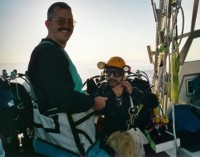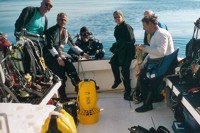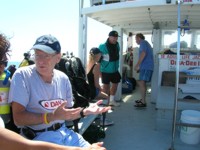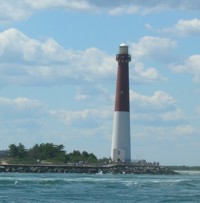Dive Report for the Spring Tide Nov 19, 05
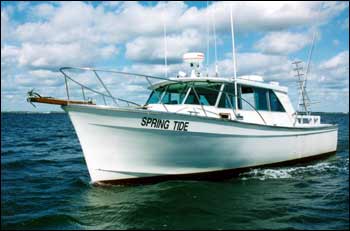 Summary:
Summary:
Surface 45 deg air, 56 deg water, vis clearing to 20 ft.
Bottom 58 deg, 30 ft vis, dark but better, tog, seabass, pollock, mussels.
We finally reschedule our Algol trip from last month, and headed out for the final 2005 club dive of the South Jersey Dive Club. Today we were on the Spring Tide with Captain Ron, and the Bartman. Earlier this year we tried for the Coney Island, but ended up on the Algol. This time we headed for the Algol, and ended up on the Coney Island. Both are good dives at nearly the same depths, so it was not an issue.
The air was a crisp 18 degrees as I drove through the pine barrens. Mercifully, by the time we reached the shore, the mercury was back to 34. Carrying 120lb of gear onto a dive boat with ice on the deck can be dangerous. The air warmed up to the mid 40s once we were out on the water. The wind was light in the morning, but kicked up to 10-15 in the afternoon. Many of us were huddling out of the wind to keep warm.
The water on the other hand was 58 on the bottom and 56 on the surface. There was little to no current. Dropping down the anchor line was just that, a straight drop. The coffee color on the surface has cleared up to some extent. The granny line could be seen from the surface and the equipment lines were visible from the other side of the boat. Dropping down to the deck of the Coney Island, the bottom vis bouncy castle for sale was a good 30 ft, but still on the dark side. We were tied in just forward of the wheel house by one of the railings. The beacon on the hook could be seen from the other side of the ship.
The first dive was a sight seeing trip. The HID lights cut through the dark and scared most of the fish inside the wreck. There are a lot more holes in the deck now. Time is starting to take it’s toll on the structure. The roof of the wheel house is almost completely gone.
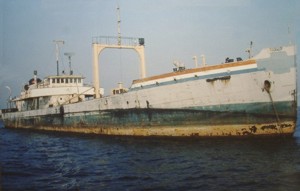 |
The Coney Island |
Large mussels were here and there on the deck and vertical surfaces. There were a few tog, but not many. Half way through my dive I was surprised by a large tog swimming out of a hole in the deck. My guess would be that he was over 3 ft. As we were armed only with lights, he was quite safe. Several large pollock could be seen darting into holes here and there. Occasionally a seabass would swim by, but nothing very big.
After circling the deck it was time to surface and face the cold air. The wind had picked up and there was now some surface chop. Not much, but more than when we arrived. While off gassing during the surface interval the Bartman was sorting through his mussels, while I assembled my pole spear for the next dive. On a clear day like this you could see why they called this the parking lot. There were dive flags everywhere. The Algol is a short distance away, and other wrecks where not much further. We could identify most of the dive boats without binoculars.
By the time I hopped in for the second dive, Bartman was already on his third bag of mussels. I was hoping for one of those pollock. I figured that big tog would be smart and hide. They don’t get big by being dumb. I did not see him at all on the second dive. The pollock were deep in the hold. After finding a large enough hole in the deck, I tried to approach one, but he was having no parts of it. It was too dark to not use a light, but the light was chasing him away. After a couple of tries, reason got the best of me, and I headed back above deck. There had been some smaller pollock by the stern so I headed that way. They too were having no parts of this encounter, and ducked into holes in the deck. I consoled myself with a large winter flounder, and headed up.
Bartman was headed in to pull the hook as the last diver boarded the boat. Changing into dry cloths felt great. Just a short nap latter and we were back at the dock. Another great day of diving!!!
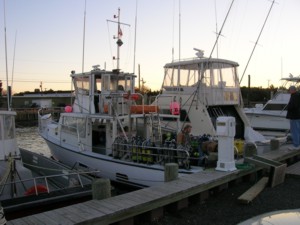 Synopsis: Cloudy surface, dark bottom 30ft vis with light. Trigger, Lobster, Winter Flounder, Tog, few Sea Bass, Artifacts, Temp 58.
Synopsis: Cloudy surface, dark bottom 30ft vis with light. Trigger, Lobster, Winter Flounder, Tog, few Sea Bass, Artifacts, Temp 58.
